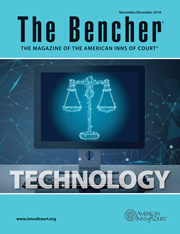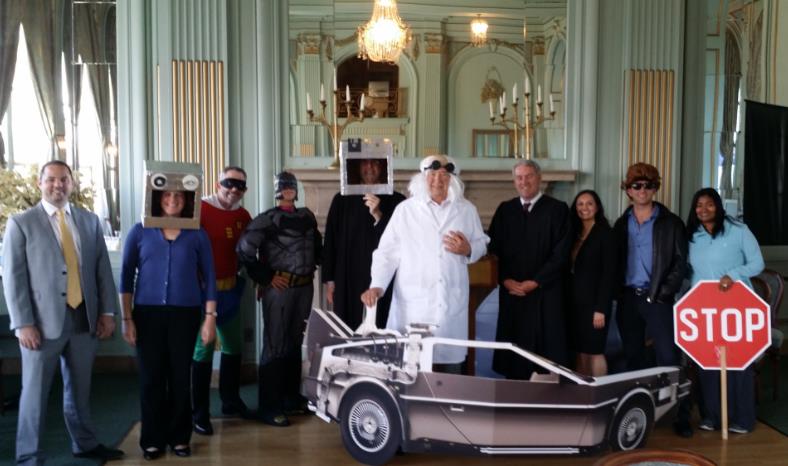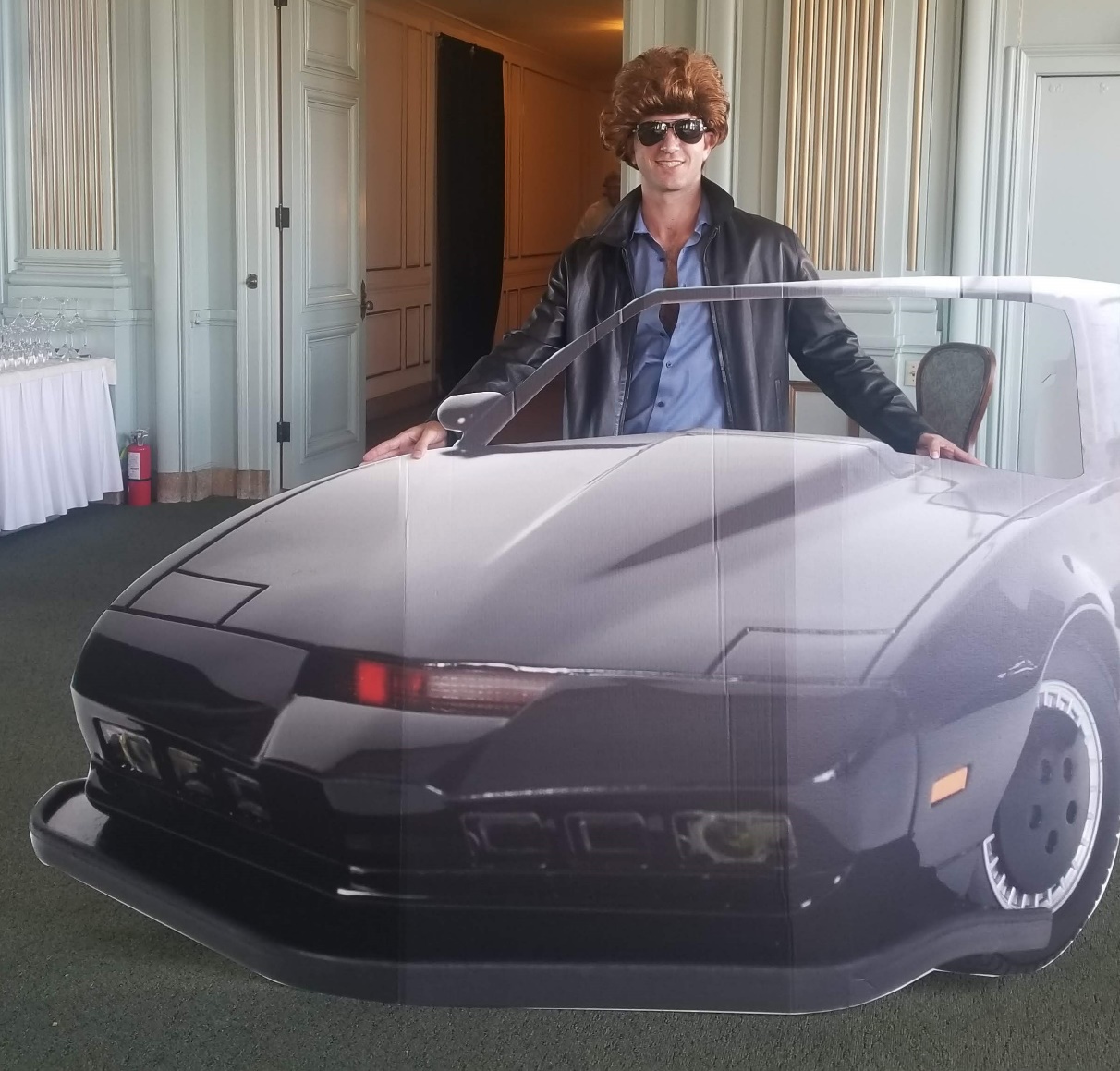Bot to the Future
The Bencher—November/December 2018
By Adam M. Carlson, Esquire
 Whether the legal field, or the world, is ready for it, artificial intelligence (AI) is taking over. For several months a team of members of the Earl Warren American Inn of Court pondered the application, pitfalls, and inevitable impact that the advancement of AI will have on our vocation. We learned that judges, lawyers, and courtroom practitioners alike will face many interesting challenges.
Whether the legal field, or the world, is ready for it, artificial intelligence (AI) is taking over. For several months a team of members of the Earl Warren American Inn of Court pondered the application, pitfalls, and inevitable impact that the advancement of AI will have on our vocation. We learned that judges, lawyers, and courtroom practitioners alike will face many interesting challenges.
The journey started with an idea for our program: Batman in the Batmobile, Emmett “Doc” Brown in the Back to the Future DeLorean, and Michael Knight in the Knight Rider KITT all getting into a car accident, seriously injuring a pedestrian in the process. Mix in some contemporary criminal elements, such as marijuana ingestion while behind the wheel; stir in a heavy dose of AI involvement, such as automation and semi-automation on the vehicles; and finish it with a combination of human and robot lawyers and judges adjudicating the legal chaos that ensued, and you have a veritable Inn of Court program.
Our script and presentation were guided by recent news stories involving automated and semi-automated vehicles in which people were either seriously injured or killed. Researching these events provided fruitful fodder for our meetings. Recognizing that the prevalence of AI-controlled vehicles will increase in years to come, we decided to base our program in the future.
Our team crammed into the DeLorean, adjusted the date on the dashboard, and hurtled ourselves forward to the year 2068. Upon arrival we noticed that AI’s presence was quite commonplace and the legal system was wrought with attendant challenges. However, we had not anticipated the complexities of the issues raised by having robots wreaking havoc on our judicial system. Have we adequately contemplated the consequences of AI on the legal profession, such as robots serving as substitutes for lawyers and judges? Where will we, as attorneys and judges, fit into the equation? Is there even work for us in the Superior Court in 2068? And, of course, who should be responsible, criminally or civilly, in a crash involving robot cars?
In our skit, Batman crashed his semi-automated Batmobile while involuntarily intoxicated—because jealous crime-fighting partner Robin spiked his drink—then fled the scene. Batman was eventually caught and charged with several crimes under the penal and vehicle codes. He was arraigned in front of a robot judge. The contested issue at the hearing was Batman’s custodial status.
Having a robot judge presiding over the bail hearing created layers upon layers of issues for us to unpack. Would the robot simply weigh factors, punch them into a formula, and arrive at a decision? Perhaps this is a good thing, as the judge can be a truly dispassionate neutral. It made us wonder whether the law should be more of a science than an art. A human judge might be more susceptible to arguments strumming on the emotional heart strings, whereas a robot judge would be rigid and formulaic. Do we prefer a human element to be part of the evaluation? Is the human element necessary for justice to be appropriately rendered?
We figured out that if the robot judge simply applied factors to an algorithm then the attorneys would likely have access to the same system. As a practitioner would it be easier to advise clients on what to do because we could predict the outcome? Wouldn’t it be nice for Mr. or Ms. Future Attorney to be able to accurately and precisely advise a client on the outcomes of his or her case and upcoming hearings? But because the robot judge would be applying factors from the data, what would be the purpose of the lawyer? If no lawyer would be needed at the hearing, then why have a lawyer at all? Uh oh, Future Attorney might be out of a job.
 Our program also explored the ramifications of AI on other matters, such as criminal and civil liability. In a second example, Doc Brown was driving home while pondering his next great invention. He was scribbling away furiously on a notepad, comforted by the fact that his DeLorean had the latest in AI self-driving technology. Why pay attention, he figured, since the vehicle would do it for him?
Our program also explored the ramifications of AI on other matters, such as criminal and civil liability. In a second example, Doc Brown was driving home while pondering his next great invention. He was scribbling away furiously on a notepad, comforted by the fact that his DeLorean had the latest in AI self-driving technology. Why pay attention, he figured, since the vehicle would do it for him?
So when his car crashed, injuring a pedestrian, and he got sued, his reaction could only be, “Great Scott!” Our team found more hidden questions in the futuristic mess of a superhero car accident. Should Doc be liable? Should the law impose liability on individuals to encourage consumers to educate themselves before purchasing a potentially deadly robot machine? If Doc was liable, did he have a legitimate cross-claim for indemnity?
Some in our group suggested that as part of purchasing a car with autonomous or semi-autonomous features they would obtain a warranty from the manufacturer. Essentially, they would want an agreement that the manufacturer would defend and indemnify them if they were held civilly liable in an incident in which a malfunctioning AI was a causative factor.
The civil liability complexities did not stop there. The standard for product liability is strict liability. Should the law impose strict liability on the driver of a robot car? Or would the plaintiff still have to show that the driver was negligent? What is considered negligence? Is doing your due diligence to make sure you are buying from a reputable technology company enough to defend yourself in the event of a lawsuit?
 And then there is criminal liability. As it turns out, Michael Knight was on his way home high on pot cookies. His defense was that he was in an autonomous car and not even driving! Could you be held criminally liable if you’re too intoxicated to drive but you’re behind the wheel of an autonomous car? Should the law require that you stay sober in case you need to take the wheel at any moment?
And then there is criminal liability. As it turns out, Michael Knight was on his way home high on pot cookies. His defense was that he was in an autonomous car and not even driving! Could you be held criminally liable if you’re too intoxicated to drive but you’re behind the wheel of an autonomous car? Should the law require that you stay sober in case you need to take the wheel at any moment?
The program concluded with judgment being rendered. Michael Knight’s defense won over the jury of six humans and six robots. Doc paid out millions to the injured pedestrian but got it all back from the manufacturer of the DeLorean. And Robin, riddled with guilt, confessed to poisoning Batman’s drink, freeing Batman. Unfortunately, Robin came forward too late and the Joker got away.
Despite our best efforts, our team could not find answers to all of the questions we posed in the context of this devastating, albeit comedic, car accident. Obviously, the laws will have to develop over time to address these issues. The challenges our legal system will face in 2068 are apparently too difficult for us to solve with 2018 brains. So instead of solving the problems, we tackled them as any Inn team would, with jokes, wigs, musical interludes, and discussions with our fellow Inn members.
Adam M. Carlson, Esquire, is managing partner at Casper, Meadows, Schwartz & Cook in Walnut Creek, California. He is a Barrister member of the Earl Warren American Inn of Court in Oakland, California.